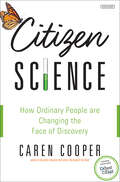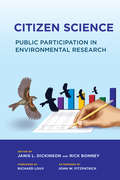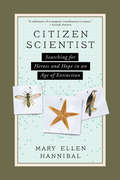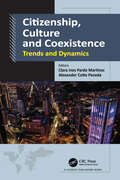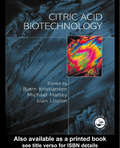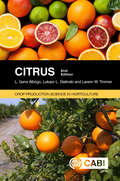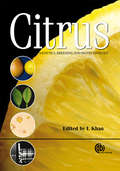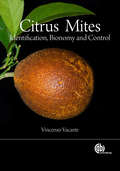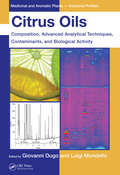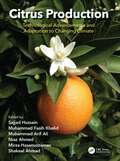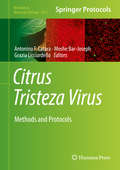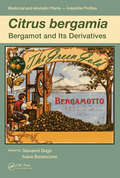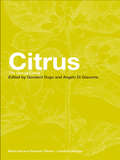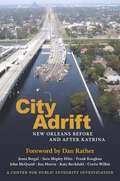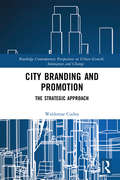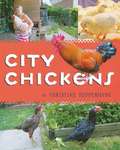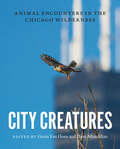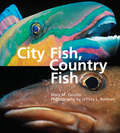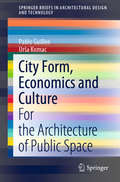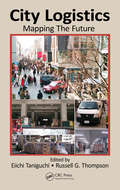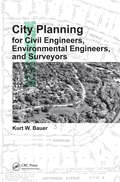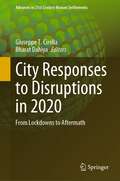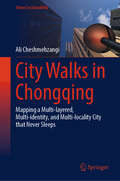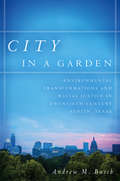- Table View
- List View
Citizen Science: How Ordinary People are Changing the Face of Discovery
by Caren CooperThe engaging history of the people whose contributions to scientific pursuits make us rethink the meaning of the word "scientist." Think you need a degree in science to contribute to important scientific discoveries? Think again. All around the world, in fields ranging from astronomy to zoology, millions of everyday people are choosing to participate in the scientific process. Working in cooperation with scientists in pursuit of information, innovation, and discovery, these volunteers are following protocols, collecting and reviewing data, and sharing their observations. They are our neighbors, our in-laws, and people in the office down the hall. Their story, along with the story of the social good that can result from citizen science, has largely been untold, until now. Citizen scientists are challenging old notions about who can conduct research, where knowledge can be acquired, and even how solutions to some of our biggest societal problems might emerge. In telling their story, Cooper will inspire readers to rethink their own assumptions about the role that individuals can play in gaining scientific understanding and putting that understanding to use as stewards of our world. Citizen Science will be a rallying call-to-arms, and will also function as an authoritative resource for those inspired by the featured stories and message.
Citizen Science: Public Participation in Environmental Research
by Richard Louv John W. Fitzpatrick Janis L. Dickinson Rick BonneyCitizen science enlists members of the public to make and record useful observations, such as counting birds in their backyards, watching for the first budding leaf in spring, or measuring local snowfall. The large numbers of volunteers who participate in projects such as Project FeederWatch or Project BudBurst collect valuable research data, which, when pooled together, create an enormous body of scientific data on a vast geographic scale. In return, such projects aim to increase participants' connections to science, place, and nature, while supporting science literacy and environmental stewardship. In Citizen Science, experts from a variety of disciplines-including scientists and education specialists working at the Cornell Lab of Ornithology, where many large citizen science programs use birds as proxies for biodiversity-share their experiences of creating and implementing successful citizen science projects, primarily those that use massive data sets gathered by citizen scientists to better understand the impact of environmental change.This first and foundational book for this developing field of inquiry addresses basic aspects of how to conduct citizen science projects, including goal-setting, program design, and evaluation, as well as the nuances of creating a robust digital infrastructure and recruiting a large participant base through communications and marketing. An overview of the types of research approaches and techniques demonstrates how to make use of large data sets arising from citizen science projects. A final section focuses on citizen science's impacts and its broad connections to understanding the human dimensions and educational aspects of participation. Citizen Science teaches teams of program developers and researchers how to cross the bridge from success at public engagement to using citizen science data to understand patterns and trends or to test hypotheses about how ecological processes respond to change at large geographic scales. Intended as a resource for a broad audience of experts and practitioners in natural sciences, information science, and social sciences, this book can be used to better understand how to improve existing programs, develop new ones, and make better use of the data resources that have accumulated from citizen science efforts. Its focus on harnessing the impact of "crowdsourcing" for scientific and educational endeavors is applicable to a wide range of fields, especially those that touch on the importance of massive collaboration aimed at understanding and conserving what we can of the natural world.
Citizen Scientist: Searching for Heroes and Hope in an Age of Extinction
by Mary Ellen HannibalA San Francisco Chronicle Best Book of the Year: “Intelligent and impassioned, Citizen Scientist is essential reading for anyone interested in the natural world.”A Nautilus Award Winner in Ecology and EnvironmentAward-winning writer Mary Ellen Hannibal has long reported on scientists’ efforts to protect vanishing species. But it was only through citizen science that she found she could take action herself. As she wades into tide pools, spots hawks, and scours mountains, she discovers the power of the heroic volunteers who are helping scientists measure—and even slow—today’s unprecedented mass extinction. Citizen science may be the future of large-scale field research—and “might be our last, best hope for solving myriad environmental predicaments” (Library Journal).our planet’s last, best hope.“Inspired by the likes of marine biologist Ed Ricketts, [Hannibal] records starfish die-offs, meets the geeks who track deforestation, and plans a web-based supercommunity of citizen scientists to counter what many are calling the sixth great extinction. A cogent call to action.” —Nature“Hannibal’s use of details verges on the sublime.” —East Hampton Star“[A] celebration of nonexperts’ contributions to science.” —Scientific American
Citizens of Worlds: Open-Air Toolkits for Environmental Struggle
by Jennifer GabrysAn unparalleled how-to guide to citizen-sensing practices that monitor air pollution Modern environments are awash with pollutants churning through the air, from toxic gases and intensifying carbon to carcinogenic particles and novel viruses. The effects on our bodies and our planet are perilous. Citizens of Worlds is the first thorough study of the increasingly widespread use of digital technologies to monitor and respond to air pollution. It presents practice-based research on working with communities and making sensor toolkits to detect pollution while examining the political subjects, relations, and worlds these technologies generate. Drawing on data from the Citizen Sense research group, which worked with communities in the United States and the United Kingdom to develop digital-sensor toolkits, Jennifer Gabrys argues that citizen-oriented technologies promise positive change but then collide with entrenched and inequitable power structures. She asks: Who or what constitutes a &“citizen&” in citizen sensing? How do digital sensing technologies enable or constrain environmental citizenship? Spanning three project areas, this study describes collaborations to monitor air pollution from fracking infrastructure, to document emissions in urban environments, and to create air-quality gardens. As these projects show, how people respond to, care for, and struggle to transform environmental conditions informs the political subjects and collectives they become as they strive for more breathable worlds.
Citizenship, Culture and Coexistence: Trends and Dynamics
by Alexander Cotte Poveda Clara Ines Pardo MartinezThis book seeks to contribute to the most recent discussions on Citizenship, Culture and Coexistence in different context considering the importance of these elements for society and urban environments. The book offers different perspectives on citizenship culture and analysis that can be inputs for policy and decision makers to design the policies, strategies and programs that strengthen urban process from culture, art, and education to improve citizen coexistence, respect for differences and better societies in a dynamic world with permanent challenges.
Citric Acid Biotechnology
by Bjørn Kristiansen Michael Mattey Joan LindenThis work covers citric acid fermentation methods including recent advances and approaches. The book looks at all aspects of the fermentation process and should be of interest to those working in biotechnology, microbiology and biochemistry.
Citrus (Crop Production Science In Horticulture Ser.)
by L. Gene Albrigo Dr Lukasz L. Stelinski Lavern TimmerCitrus fruit, originating in Southeast Asia, have been cultivated and enjoyed for over 4000 years. Moreover, they are grown in nearly every country within 40°north-south latitude, the major producers being China, Brazil, the USA, and countries bordering the Mediterranean. This new edition continues to adopt an international perspective on citrus, covering its biology and cultivation as well as considering issues in the citrus industry and providing examples from around the world. The authors include discussion on important topics such as biotechnical advances in citrus genetics, current techniques in breeding, the role of climatic factors in worldwide production, the importance of rootstocks, plant husbandry, pests and diseases, and postharvest technology. They emphasize current theories and technological advances in citriculture, citing specific examples of how they are used and in which regions. Citrus 2nd edition describes the scientific basis of production practices and is aimed at professionals in the industry as well as advanced students of horticulture and allied disciplines within plant science and food science.
Citrus Genetics, Breeding and Biotechnology
by Iqrar Ahmad KhanThis book provides a comprehensive review of citrus breeding, including relevant genetics, molecular biology and biotechnology.
Citrus Mites: Identification, Bionomy and Control
by Vincenzo VacanteCitrus pests are a serious issue for crop growers, causing problems in yield and economic losses. Citrus Mites is a comprehensive study of mites harmful to citrus plants from all citrus growing regions around the world. Providing a useful resource for identifying citrus crop pests, the text will also address methods of removal from plants, describe symptoms of damage caused by pests and discuss methods of eradication and control, making it essential for horticulturalists, pomologists and acarologists as well as practitioners, researchers and students of crop protection and pest management.
Citrus Oils: Composition, Advanced Analytical Techniques, Contaminants, and Biological Activity (Medicinal and Aromatic Plants - Industrial Profiles)
by Luigi Mondello Giovanni DugoWorld production of citrus fruits is still growing. At present, about 30 percent of that yield is devoted to industrial production, mostly on those essential oils and juices used in foods, pharmaceuticals, and cosmetics. Covering research reported in the literature over the past ten years, this book presents the most current research available
Citrus Production: Technological Advancements and Adaptation to Changing Climate
by Mirza Hasanuzzaman Sajjad Hussain Shakeel Ahmad Niaz Ahmed Muhammad Fasih Khalid Muhammad Arif AliThe citrus industry is one of the world's most important fruit production industries, but global climate change, pests, diseases, and improper handling are affecting plant yields. Citrus Production: Technological Advancements and Adaptation to Changing Climate presents information on advancements in the citrus industry examining various aspects of citrus from its production to harvest. It looks at the challenges and approaches in stress tolerance improvements, increasing citrus crop productivity, and reducing postharvest losses. The book details taxonomy, genetic diversity, and metabolic and molecular responses in citrus crops, as well as abiotic and biotic stresses affecting citrus production. Featuring numerous full-color illustrations throughout, this book poses new harvesting techniques along with postharvest physiology of citrus fruits, devising strategies to prevent crop losses. Citrus Production: Technological Advancements and Adaptation to Changing Climate is an essential resource for researchers, academicians, and scientists looking to expand their knowledge of citrus, particularly horticulturists, food scientists, and botanists.
Citrus Tristeza Virus: Methods and Protocols (Methods in Molecular Biology #2015)
by Antonino F. Catara Moshe Bar-Joseph Grazia LicciardelloThis book provides methods and clear protocols for the various technologies available to detect, characterize, and study Citrus tristeza virus (CTV), a member of the genus Closterovirus, family Closteroviridae. Thanks to the highly sensitive and specific diagnostic procedures developed, knowledge of the molecular characteristics, expression strategies, genetic variability, and epidemiology of the virus has improved significantly, as this volume reflects. Written for the highly successful Methods in Molecular Biology series, chapters include introductions to their respective topics, lists of the necessary materials and reagents, step-by-step, readily reproducible laboratory protocols, and tips on troubleshooting and avoiding known pitfalls. Authoritative and practical, Citrus Tristeza Virus: Methods and Protocols serves as an ideal guide for plant pathologists, plant virologists, molecular biologists, and graduate students interested in performing qualitative and quantitative tests as well as recently-developed diagnostic methods in order to find solutions to improve the management of this disease.
Citrus bergamia: Bergamot and its Derivatives
by Giovanni Dugo Ivana BonaccorsiIn Calabria, Italy, where bergamot has been successfully cultivated since the eighteenth century, it is commonly defined as "the prince of the Citrus genus." Written by an international panel of experts from multiple disciplines, Citrus bergamia: Bergamot and its Derivatives represents the most complete treatise on bergamot and its derivatives curr
Citrus: The Genus Citrus (Medicinal And Aromatic Plants - Industrial Profiles Ser.)
by Giovanni Dugo Angelo Di GiacomoThe world production of citrus fruit has risen enormously, leaping from forty-five million tons a year to eighty-five million in the last 30 years. Today, the potential applications of their essential oils are growing wider, with nearly 40% of fresh produce processed for industrial purposes.Citrus: The Genus Citrus offers comprehensive cove
City Adrift: New Orleans Before and After Katrina
by Dan Rather Center for Public IntegrityHurricane Katrina was a stunning example of complete civic breakdown. Beginning on August 29, 2005, the world watched in horror as -- despite all the warnings and studies -- every system that might have protected New Orleans failed. Levees and canals buckled, pouring more than 100 billion gallons of floodwater into the city. Botched communications crippled rescue operations. Buses that might have evacuated thousands never came. Hospitals lost power, and patients lay suffering in darkness and stifling heat. At least 1,400 Louisianans died in Hurricane Katrina, more than half of them from New Orleans, and hundreds of thousands more were displaced, many still wondering if they will ever be able to return. How could all of this have happened in twenty-first-century America? And could it all happen again?To answer these questions, the Center for Public Integrity commissioned seven seasoned journalists to travel to New Orleans and investigate the storm's aftermath. In City Adrift: New Orleans Before and After Katrina, they present their findings. The stellar roster of contributors includes Pulitzer Prize-winner John McQuaid, whose earlier work predicted the failure of the levees and the impending disaster; longtime Boston Globe newsman Curtis Wilkie, a French Quarter resident for nearly fifteen years; and Katy Reckdahl, an award-winning freelance journalist who gave birth to her son in a New Orleans hospital the day before Katrina hit.They and the rest of the investigative team interviewed homeowners and health officials, first responders and politicians, and evacuees and other ordinary citizens to explore the storm from numerous angles, including health care, social services, housing and insurance, and emergency preparedness. They also identify the political, social, geographical, and technological factors that compounded the tragedy. Comprehensive and balanced, City Adrift provides not only an assessment of what went wrong in the Big Easy during and following Hurricane Katrina, but also, more importantly, a road map of what must be done to ensure that such a devastating tragedy is never repeated.
City Branding and Promotion: The Strategic Approach (Routledge Contemporary Perspectives on Urban Growth, Innovation and Change)
by Waldemar CudnyThis book explores theoretical concepts of strategic promotion and place branding in cities. It outlines the issues associated with strategic management of urban territories and highlights various types of development strategies that seek to encourage socio-economic development, growth and city branding, particularly within the tourism industry. It examines the rules and methods for analysing the current branding of a city and how new branding and promotion strategies are created. Through a range of international examples the book considers the missions, aims and implementation of branding strategies and the importance of monitoring and controlling procedures. The first part of the book provides theoretical context, followed by a detailed exploration of the promotional and branding strategy prepared for the city of Tomaszów Mazowiecki in Poland. This book provides the reader with theoretical and practical insights on city branding and will appeal to scholars and students in urban studies, geography, tourism, management and economics.
City Creatures: Animal Encounters in the Chicago Wilderness
by Gavin Van Horn Dave AftandilianWe usually think of cities as the domain of humans--but we are just one of thousands of species that call the urban landscape home. Chicago residents knowingly move among familiar creatures like squirrels, pigeons, and dogs, but might be surprised to learn about all the leafhoppers and water bears, black-crowned night herons and bison, beavers and massasauga rattlesnakes that are living alongside them. City Creatures introduces readers to an astonishing diversity of urban wildlife with a unique and accessible mix of essays, poetry, paintings, and photographs. The contributors bring a story-based approach to this urban safari, taking readers on birding expeditions to the Magic Hedge at Montrose Harbor on the North Side, canoe trips down the South Fork of the Chicago River (better known as Bubbly Creek), and insect-collecting forays or restoration work days in the suburban forest preserves. The book is organized into six sections, each highlighting one type of place in which people might encounter animals in the city and suburbs. For example, schoolyard chickens and warrior wasps populate "Backyard Diversity," live giraffes loom at the zoo and taxidermy-in-progress pheasants fascinate museum-goers in "Animals on Display," and a chorus of deep-freeze frogs awaits in "Water Worlds. " Although the book is rooted in Chicago's landscape, nature lovers from cities around the globe will find a wealth of urban animal encounters that will open their senses to a new world that has been there all along. Its powerful combination of insightful narratives, numinous poetry, and full-color art throughout will help readers see the city--and the creatures who share it with us--in an entirely new light.
City Fish, Country Fish
by Mary M. Cerullo Jeffry RotmanSome people live in the country, close to the land, where they enjoy peace and quiet. Others live in high-rise apartments in the city and love the hustle and bustle of crowds and nonstop activity, both day and night. In the ocean, too, there are places that have some of the characteristics of the country or of the city. Like the classic tale of The City Mouse and the Country Mouse, there are advantages and disadvantages to each habitat. We'll compare how the fishes that live in tropical seas (the city) and those that swim through cold oceans (the country) meet the challenges and opportunities of their own ecosystems. We will examine how color, shape, and size, as well as behaviors and adaptations, help them survive in their particular habitat. We'll explore characteristics that make them different, as well as things that make them the same.
City Form, Economics and Culture: For the Architecture of Public Space (SpringerBriefs in Architectural Design and Technology)
by Pablo Guillen Urša KomacThis is a book about how cities occupy space. We are not interested in architectural masterpieces, but the tools for reinventing city life. We try to provide a framework for the architecture and design of public space without aesthetic considerations. We identify several defining factors. First of all, history as the city today very much depends on how it was yesterday. The geographical location and the technology available at a point of time both play a constraining role in what can be done as well. Culture, in the form of social norms, laws and regulations, also restricts what is possible to do. On the other hand, culture is also important in guiding the ideas and aspirations that together inform what society wants the city to be. The city needs government intervention, or regulation, to ameliorate the problem posed by a tangle of externalities and public goods. We focus on two comparative case studies: the evolution of urban form in the US and how it stands in a sharp contrast with the evolution of urban form in Japan. We emphasise the difference in regulations between both jurisdictions. We study how differences in technological choices driven by culture (i.e. racial segregation), geography (i.e. the availability of land) and history (i.e. the mobility restrictions of the Tokugawa period) result in vast differences in mobility regarding the share of public transport, walking and cycling versus motorised private transport. American cities are constrained by rules that are much further from the neoliberal economic idea of free and competitive markets than the Japanese ones. Japanese planning promotes competition and through a granular, walkable city dotted with small shops, fosters variety in the availability of goods and services. We hypothesise how changing regulations could change the urban form to generate a greater variety of goods and to foster the access to those goods through a more equitable distribution of wealth. Critically, we point out that a desirably denser city must rely on public transport, and we also study how a less-dense city can be made to work with public transport. We conclude by claiming that changes in regulations are very unlikely to happen in the US, as it would require deep cultural changes to move from local to a more universal and less excluding public good provision, but they are both possible and desirable in other jurisdictions.
City Logistics: Mapping The Future
by Eiichi Taniguchi Russell G. ThompsonCity Logistics: Mapping The Future examines the key concepts of city logistics along with the associated implementation issues, methodologies, and policy measures. Chronicling the growth of city logistics as a discipline and how planning and policy have improved practice over the last ten years, it details the technologies, policies, and plans that
City Planning for Civil Engineers, Environmental Engineers, and Surveyors
by Kurt W. BauerWhile engineers and surveyors are not urban planners, they are often engaged in urban development. Therefore, a high degree of competence in civil engineering specialties such as surveying and mapping, highway and transportation engineering, water resources engineering, environmental engineering, and, particularly, municipal engineering requires an
City Responses to Disruptions in 2020: From Lockdowns to Aftermath (Advances in 21st Century Human Settlements)
by Bharat Dahiya Giuseppe T. CirellaThis book presents the integrating of economics and urban geography to create a framework of cooperation around the idea of urban economic stability. It explores these disciplines through the economic lens and creates a collaborative environment for addressing the global challenges caused by the COVID-19 pandemic and future global shocks. Environmental advocates and proponents of economic growth are increasingly at odds—having looked at the economic impact of the decline of the environment as well as the environmental loss that occurs with unchecked growth and urbanization. The outbreak of the COVID-19 pandemic changed the global scene. The world shook in its foundations, as a number of countries’ lockdown affected not only the global economy but also society and the environment. The global community has seen the negative impact of COVID-19 on our economies. There have been steep declines in gross domestic product, job losses have been in the millions, and people have seen their incomes fall. An unplanned shutdown has taken its toll and has been a shock to the economies of the world. Past shocks and how they have impacted urban economies as well as for how long are core to bettering our understanding of present and future urban economic change. The underlying economic factors that make a shock more damaging to certain economies or industries, as well as understanding these vulnerabilities, help entities recover from economic shocks and allow them to better understand how impacts on individual businesses can be implemented. The pandemic revealed the need to adopt a global development approach, taking into consideration four dimensions: global value chains, debt, digitalization, and the environment. Topics related to the causation and lockdown are explored through a number of case studies from around the world.
City Walks in Chongqing: Mapping a Multi-layered, Multi-identity, and Multi-locality City that Never Sleeps (Urban Sustainability)
by Ali CheshmehzangiCity walks enable us to think and feel more intricately, and by living through them – hopefully less ostentatiously - through experiences and relations that genuinely matter. This sort of spatial syntagma is made of many correlations based on knowing what happens in cities, feeling what attributes are important, and articulating a set of relations to develop socio-spatial inter-relations and, ultimately, identities. In a way, &“city walks&” should empower cities to talk penetratingly while we hear, feel, and observe through experiences and thinking. Hence, city walks help the city talk. The City of Chongqing means a lot to me. It is a city that allows you to fall in love with a sense of urbanity for city life and experiences. It is a city that creates a distinguishable set of relations, both transient and abiding in many ways. It is a city with a different tone of heartbeat during the day and the night, a sort of vibration that lives through many arteries at different nodes, settings, and connections. It is a city of multiple networks - different from many other cities - that never sleeps. Most importantly, Chongqing has a unique magnitude of everything that a city can offer. It is a city that can be experienced differently every time you visit it, and you can live through those diminutive experiences via greater connections and expounded senses that exist but have to be experienced first. In this book, Chongqing is studied based on its sophistication of having multiple layers, multiple identities, and multiple localities. Hence, it is structured based on these three crucial aspects, including (urban) values, attributes, experiences, and livelihoods of Chongqing. This book is the first of its kind for a Chinese city and is aimed to reveal a genuine gem while accentuating with pride a city that never sleeps. This should be read and understood by scholars, urban researchers, and urban specialists seeking to develop better cities and communities. &“Just Brilliant! Chongqing has never been portrayed any better than this book does so miraculously&”. - Tian Tang, Independent Researcher, China &“Another unique mapping study by the author; and this time, through sensory and perceptible city walks of a global city – the beautiful city of Chongqing&”. - Aaron Golden, Independent Researcher, UK
City in a Garden: Environmental Transformations and Racial Justice in Twentieth-Century Austin, Texas
by Andrew M. BuschThe natural beauty of Austin, Texas, has always been central to the city's identity. From the beginning, city leaders, residents, planners, and employers consistently imagined Austin as a natural place, highlighting the region's environmental attributes as they marketed the city and planned for its growth. Yet, as Austin modernized and attracted an educated and skilled labor force, the demand to preserve its natural spaces was used to justify economic and racial segregation. This effort to create and maintain a "city in a garden" perpetuated uneven social and economic power relationships throughout the twentieth century.In telling Austin's story, Andrew M. Busch invites readers to consider the wider implications of environmentally friendly urban development. While Austin's mainstream environmental record is impressive, its minority groups continue to live on the economic, social, and geographic margins of the city. By demonstrating how the city's midcentury modernization and progressive movement sustained racial oppression, restriction, and uneven development in the decades that followed, Busch reveals the darker ramifications of Austin's green growth.
